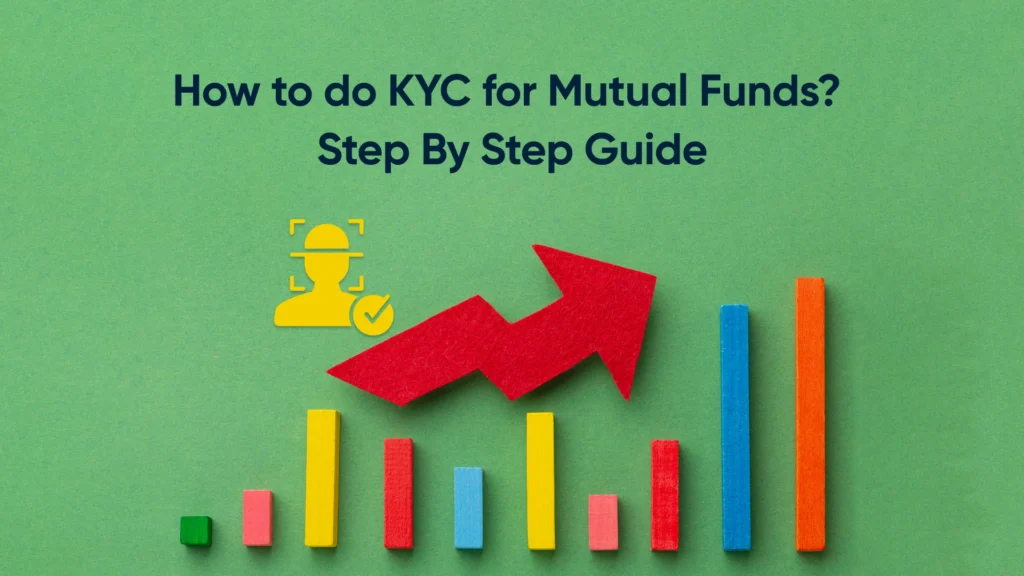How to do KYC for Mutual Funds? Step By Step Guide

As per SEBI, there is a new rule for mutual fund investors. As of April 1, 2024, mutual fund investors are required to validat e their Aadhaar and PAN for Know Your Customer (KYC). If one fails to do so, their account will be on hold, and they won’t be able to make new investments. This article explains the importance of KYC for mutual funds and a guide on how to do KYC offline and online along with a list of documents required.
Table of Contents
ToggleWhat is KYC for Mutual Funds?
KYC stands for “Know Your Customer” is a mandatory process for anyone who wants to invest in mutual funds in India. It is a system utilized by financial institutions to verify the customer’s identity. KYC ensures the transactions are secure and protects both the investor and financial institutions from any financial crimes. This system prevents money laundering or fraud, since the investor’s financial history is maintained and can be monitored in case of any discrepancy.
Importance of Mutual Fund KYC
KYC for mutual fund is important for the following reasons:
Compliance: It is a mandatory requirement set by SEBI (Securities and Exchange Board of India) to link KYC for mutual funds. Non-compliance can lead to legal consequences for both investors and institutions.
Investor Safety: KYC protects investor information and prevents any unauthorized access or misuse of funds.
Prevents Financial Frauds: KYC prevents financial frauds like money laundering since it requires identification and financial history. It ensures only registered users execute mutual fund transactions. This makes it difficult to execute frauds like unauthorized investing, money laundering etc., and further safeguards the mutual fund industry.
Risk Prevention: KYC allows the fund companies to evaluate the investor and offer them investment plans that best suit them. This ensures that the investor successfully fulfils their financial goals.
Streamlining Transactions: With KYC in place, investors can easily conduct online transactions, switch schemes or redeem investments, making the process convenient and efficient.
Also Read: Things to Know About Loans Against Mutual Funds
The Compulsory Nature of Mutual Fund KYC
It is mandatory for anyone who invests in mutual funds to complete their KYC. It is done verify identity and address of the investor. Following are important factors for doing a Mutual Fund KYC:
Protects Investor: KYC maintains transparency and accountability for the investor. It ensures that the investor understands the financial investments they undertake. Their identity and personal information are protected against misuse or identity theft.
Combats financial crimes: Mutual fund companies require the financial history of the investors. This prevents any cases of money laundering or fraud since there is transparency, and all financial records are maintained.
Regulatory Compliance: SEBI has mandated KYC for mutual funds to protect investors and maintain transparency in the industry.
Risk Evaluation: KYC allows mutual fund companies to assess the risk for an investor and suggest investment options that best suit their requirements and financial goals.
Also Read: Types of Mutual Funds by Categories
Steps to Do KYC for Mutual Funds
To complete KYC for mutual funds, here is our step-by-step guide:
Step 1: Documentation
Get all the required documents ready. This includes Proof of Identity (PAN card, Aadhar Card or any government issues proof of identity), Proof of Address (Aadhar card, driving license, passport or electricity bill) This document should clearly include your Passport size photo, PAN Card and Aadhaar Card.
Step 2: Select KYC Registration Agency (KRA)
Choose a KYC Registration Agency. Popular ones include NDML KRA, CAMS KRA or Karvy KRA. These are registered under SEBI (Securities and Exchange Board of India) and maintain KYC records of investors.
Step 3: Fill Out the KYC Form
Provide basic details like your name, address, date of birth, PAN number, email, and phone number in the mutual fund KYC Form. Make sure that you give accurate and verified information.
Step 4: Submit the Form
You can submit the form along with the required documents online. Or you can submit it offline by sending them via courier or visiting the KRA agency. Make sure to attach self-attested documents along with the form.
Step 5: In-person Verification (IPV)
In-person verification (IPV) is done at the mutual fund house or the KRA office. It is done by an authorized person to verify the information given. In some instances, it can also be done via video verification, where the verification is done by a video call.
Step 6: KYC Confirmation
Once the IPV is completed and the documents are verified, the KRA processes the application. This process takes a few days for approval. When the KYC is approved, you get “KYC Approved” status. In case of any issue, your status will be shown as ‘KYC On Hold’ or ‘KYC Rejected’. You must contact the KRA to get it resolved.
Offline KYC for Mutual Funds
To do offline KYC for mutual funds, here are the options:
Offline KYC with KRA: Individuals can get the form from CDSL’s website. Here are the steps for offline KYC with KRA-
1. Download the KYC application form from CDSL.
2. Fill in the form with details like PAN card, identity proof and address proof along with attested photographs.
3. After completion, submit the form to the mutual fund house or intermediary at their office. The individual has to go to the KRA location and submit the form along with any other documentation.
Offline KYC with Intermediary platform: If one plans to invest through a specific fund company or a mutual fund platform, they will guide you with the KYC process. These are the steps to apply:
1. Fill in the KYC registration form.
2. The intermediary platform is registered with a KYC Registered Agency. After the form is submitted, the intermediary co-ordinates with the KRA to complete the process.
3. The company creates KYC with the given PAN number.
Online KYC for Mutual Funds
For online KYC for mutual funds, these are the options available:
Online KYC with KRA: One can visit the website of any KRA (KYC registered agency). You need to create an account and fill in your information. Scan and upload the documents required. Once the KYC is done, either offline or online, you receive a KYC identification number. This number is to be shared with the preferred investment platform before you start investing.
Via mutual fund websites or platform: Many mutual fund platforms offer online KYC options for their users. The application process is like KRA one and might also include video-verification.
Aadhar based eKYC: Many mutual fund companies and investment platforms offer Aadhar-based eKYC. While the option of eKYC for mutual fund is optional, many investors do prefer this option.
List of Documents needed for Mutual Fund KYC
To complete KYC for mutual funds, below is a list of documents required:
Proof of identity: For giving proof of identity, you can submit any one of the documents:
- PAN Card
- Aadhar Card
- Passport
- Voter ID
- Driving License
Proof of address: For proof of address, you can submit any one of the documents
- Aadhaar card
- Passport
- Voter ID
- Utility bill (electricity, water, gas, or telephone)
- Bank statement
- Rent agreement
How to Check KYC Status Online for Mutual Funds?
To check KYC status for mutual funds online, you can go to any websites of KRA (KYC Registrations Agencies) The 5 authorized KRAs are – CVL KRA, NDML KRA, DOTEX KRA, CAMS KRA, and Karvy KRA.
For Mutual funds, investors can verify their KYC status online like this:
Step 1: Visit a KRA website like to www.cvlkra.com or www.karvykra.com
Step 2: On the homepage, search for “KYC Inquiry”
Step 3: Once on a redirected new page, insert details of your PAN, solve the captcha, and then press “Submit”.
Step 4: After submission, your KYC status will appear on the screen
Step 5: Your KYC status may appear as validated, registered, or on hold. If the KYC is updated, you will receive an SMS or email, about KYC confirmation.
Also Read: Advantages and Disadvantages of Digital Loans Against Mutual Funds
Conclusion
If you are a beginner in investing or a seasoned investor, it is important to understand the regulations for mutual funds. KYC is mandatory in India for anyone investing in mutual funds. Thus, it is important to understand the steps to do KYC for a mutual fund. KYC can be done online or offline. Ultimately, KYC protects investors from any unauthorized use or identity theft. It also prevents financial crimes like money laundering or theft, since financial history is maintained in KYC. It is a mandatory regulation that protects investors and mutual fund companies alike.
Frequently Asked Questions
What Is The Importance Of KYC Using Aadhaar?
KYC (Know Your Customer) using Aadhaar helps the financial institution verify the identity of the user without any paperwork. It makes financial transactions quick and secure.
What Is The Last Date For Mutual Fund KYC?
As per SEBI guidelines, mutual fund investors were required to update their KYC by March 31 of the current year.
How Can I Check My MF KYC Status?
To check your mutual fund KYC status, you can go to the website of KYC Registration Agency. Search for “KYC Inquiry” and click enter. Input details on the page and hit “submit”. The KYC status appears on the screen based on the details given.
Is KYC Mandatory in MF?
Yes. KYC is mandatory for mutual funds in India.
What is CKYC And How Does It Relate To Mutual Fund KYC?
CKYC is Centralized KYC. It is a centralized system that stores the KYC details of the investor in a repository. This allows the investor to do the KYC once and use it across different financial institutions like mutual funds, banks, and insurance companies.
How Do I Activate My KYC for Mutual Funds?
To “activate” your KYC for mutual funds, complete the KYC process through a KYC Registration Agency (KRA) or a mutual fund distributor. Provide necessary documents like PAN card and Aadhaar card. This automatically makes your KYC valid across all mutual fund houses in India
Is There A Way To Invest In Mutual Funds Without KYC?
No. One cannot invest in a mutual fund without KYC. KYC for mutual funds is mandatory in India.
Can I Still Redeem My Investments If My Kyc Is Not Updated With Aadhaar?
No, you will not be able to redeem your investments, if your KYC is not updated with Aadhaar. Most financial institutions require your Aadhaar card linking for all transactions.
YOU MAY ALSO LIKE

Search by posts
Recent post
-
 Instant ₹10,000 Loan Without Salary Slip – Quick Approval
Instant ₹10,000 Loan Without Salary Slip – Quick Approval
-
 समान मासिक किस्त: आपकी वित्तीय खर्चों को आसान बनाने वाला तरीका
समान मासिक किस्त: आपकी वित्तीय खर्चों को आसान बनाने वाला तरीका
-
 Apply for 50000 Rupees Loan Urgently: Get Disbursed in Few Minutes
Apply for 50000 Rupees Loan Urgently: Get Disbursed in Few Minutes
-
 How to get Instant Loan on Aadhaar Card without Salary Slip
How to get Instant Loan on Aadhaar Card without Salary Slip
-
 How to Apply for a Rs. 25,000 Loan on an Aadhaar Card?
How to Apply for a Rs. 25,000 Loan on an Aadhaar Card?
Categories
- Blog (6)
- Credit History (36)
- Credit Line (7)
- Festive (4)
- Finance (15)
- Mutual Fund (19)
- Personal Loan (276)
- Tax (8)
- Zype (4)













